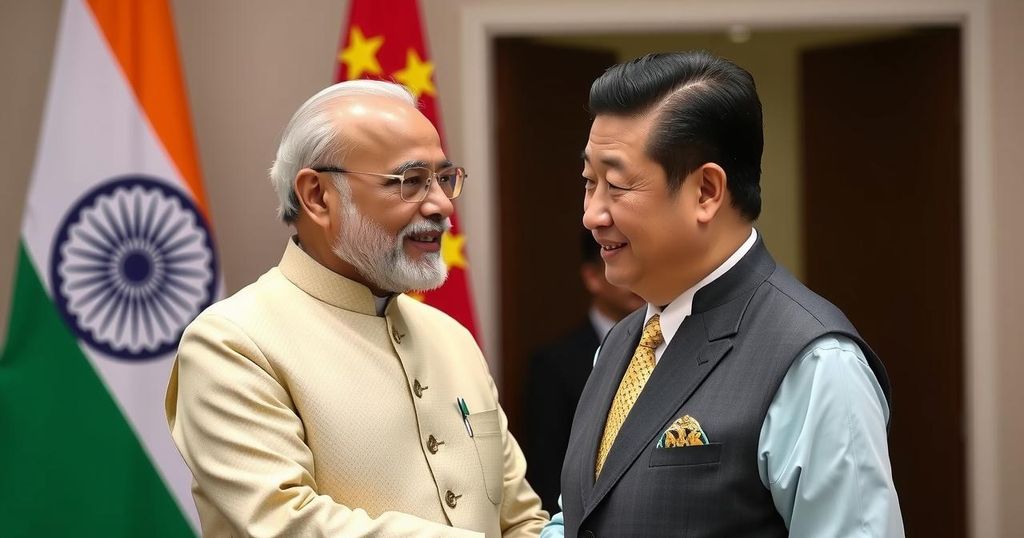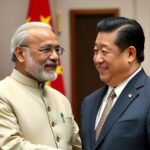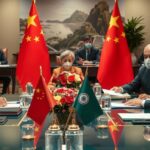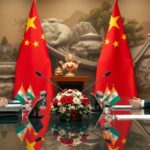Politics
AJ, AJIT DOVAL, AN, ASIA, BEIJING, BILATERAL AGREEMENTS, CHINA, DEMCHOK, DEPSANG, DO, DOVAL, FOREIGN MINISTRY, GEOPOLITICS, INDIA, INFRASTRUCTURE PROJECTS, INTERNATIONAL RELATIONS, LADAKH, LIN JIAN, MEXICO, MINISTRY OF EXTERNAL AFFAIRS, NEW DELHI, NORTH AMERICA, OF EXTERNAL AFFAIRS, S JAISHANKAR, TRADE, WANG, WANG YI
Sophia Klein
China Ready to Collaborate with India Ahead of Doval-Wang Discussions
China has expressed readiness to work with India to restore bilateral ties ahead of key Doval-Wang talks, marking the first meeting in five years focused on border issues. The discussions are expected to address peace management in contested areas and seek solutions to long-standing territorial disputes, emphasizing mutual respect and dialogue. Recent agreements on patrolling arrangements along the Ligne of Actual Control are part of this renewed engagement.
In a significant development ahead of the upcoming talks between India and China, the Chinese Foreign Ministry has expressed its willingness to collaborate with India to restore bilateral relations, which have been strained in recent years. National Security Advisor Ajit Doval is scheduled to meet Chinese Foreign Minister Wang Yi for the first Special Representatives meeting in five years, marking a critical step in addressing ongoing border tensions. Both parties aim to respect each other’s core interests and explore resolutions to longstanding disputes.
The foreign ministry’s spokesperson, Lin Jian, stated that China is committed to engaging with India to implement important mutual understandings established between their leaders. The focus will be on fostering trust through dialogue, addressing differences sincerely, and bringing the relationship back to a stable and healthy trajectory. This meeting is particularly relevant as it represents the first structured dialogue following years of relative silence on boundary resolutions.
Ahead of the talks, India has reaffirmed the agenda to manage peace in border areas and seek a fair solution to the territorial questions that have long plagued bilateral relations. Following a series of military engagements initiated in May 2020, culminating in deadly clashes, both nations recognize the need for diplomatic engagement to alleviate tensions and restore economic interactions that had deteriorated.
The last significant communication between Doval and Wang Yi occurred in December 2019 and has primarily revolved around multilateral discussions rather than directly addressing the contentious border issues. The recent agreement concerning patrolling along the Line of Actual Control (LAC) indicates progress in managing border interactions, establishing a pathway toward more comprehensive discussions poised to unfold during their discussions.
The ongoing military standoff that began in eastern Ladakh has stressed relations, and the importance of this dialogue cannot be overstated as it represents a renewed commitment to peaceful resolution and reconciliation. The Special Representatives mechanism, established in 2003, has consistently served as a platform for managing tensions despite challenges in resolving boundary disputes. The forthcoming talks aim to revitalize this critical dialogue framework, potentially paving the way for a more stable relationship between India and China.
The context of the upcoming Doval-Wang talks is deeply rooted in the recent history of India-China relations, marked by military standoffs and significant diplomatic challenges. Since May 2020, tensions have heightened following aggressive Chinese posturing in eastern Ladakh, leading to military engagements that resulted in fatalities and a near-total obstruction of economic relations between the two nations. The previous Special Representatives meeting took place in December 2019, and since then, additional discussions have largely centered around multilateral issues rather than directly addressing the border dispute that has historically been a source of contention.
In conclusion, the key meeting between National Security Advisor Ajit Doval and Foreign Minister Wang Yi represents a critical juncture for India and China as they seek to mend strained relations and establish a cooperative framework for addressing mutual concerns. Both nations express a commitment to respect core interests and facilitate dialogue as they navigate complex territorial disputes, and this dialogue may serve as a pivotal step towards restoring peace and stability along their contested borders.
Original Source: www.hindustantimes.com








Post Comment